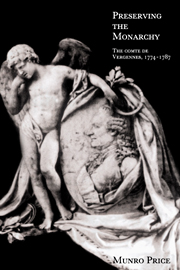Book contents
- Frontmatter
- Contents
- Acknowledgements
- List of abbreviations
- Introduction
- 1 Recalled to life
- 2 The question of reform: Turgot, Necker, and Vergennes
- 3 Vergennes as first minister: the comité des finances
- 4 The fall of the comité des finances
- 5 The politics of judicial reform
- 6 The politics of retrenchment, 1783–1785
- 7 The ministry, its divisions, and the parlement of Paris, 1785–1786
- 8 The Dutch imbroglio
- 9 Death and posterity
- Bibliography
- Index
3 - Vergennes as first minister: the comité des finances
Published online by Cambridge University Press: 31 October 2009
- Frontmatter
- Contents
- Acknowledgements
- List of abbreviations
- Introduction
- 1 Recalled to life
- 2 The question of reform: Turgot, Necker, and Vergennes
- 3 Vergennes as first minister: the comité des finances
- 4 The fall of the comité des finances
- 5 The politics of judicial reform
- 6 The politics of retrenchment, 1783–1785
- 7 The ministry, its divisions, and the parlement of Paris, 1785–1786
- 8 The Dutch imbroglio
- 9 Death and posterity
- Bibliography
- Index
Summary
Maurepas' ministerial preponderance, in which ministers were only nominated by the king with the consent of the Mentor, and in which a degree of unity was maintained by the latter's practice of sitting in on the travail of each minister with the king, lasted from 1776 to 1780. After 1780, however, it began to show clear signs of strain. Maurepas himself became increasingly feeble, to the point at which in October 1780 the queen in alliance with Necker was finally able to take the decisive step of placing two of her nominees in the ministry: the marquis de Castries at the marine and the marquis de Ségur at the département de la guerre. Although in May 1781 Maurepas was still powerful enough to secure the dismissal of Necker – whose conditions for remaining in office, if granted, would have resulted in his virtually assuming the role of first minister (one owing allegiance to the queen rather than to the king) – these struggles gravely weakened his ministry. The key positions of foreign minister, garde des sceaux, and finance minister remained in the hands of men who owed their allegiance to the king and to Maurepas: Vergennes, Miromesnil, and Necker's successor Joly de Fleury, ex-intendant of Burgundy, conseiller d'état, and scion of one of the most distinguished families of the Parisian robe. Yet the queen's party now numbered two ministers among its members. The struggle between king's party and queen's party would now take the form of a split within the ministry rather than that of a united king's ministry fighting off pressure from outside its ranks, from the queen's entourage at court.
- Type
- Chapter
- Information
- Preserving the MonarchyThe Comte de Vergennes 1774–1787, pp. 61 - 87Publisher: Cambridge University PressPrint publication year: 1995

